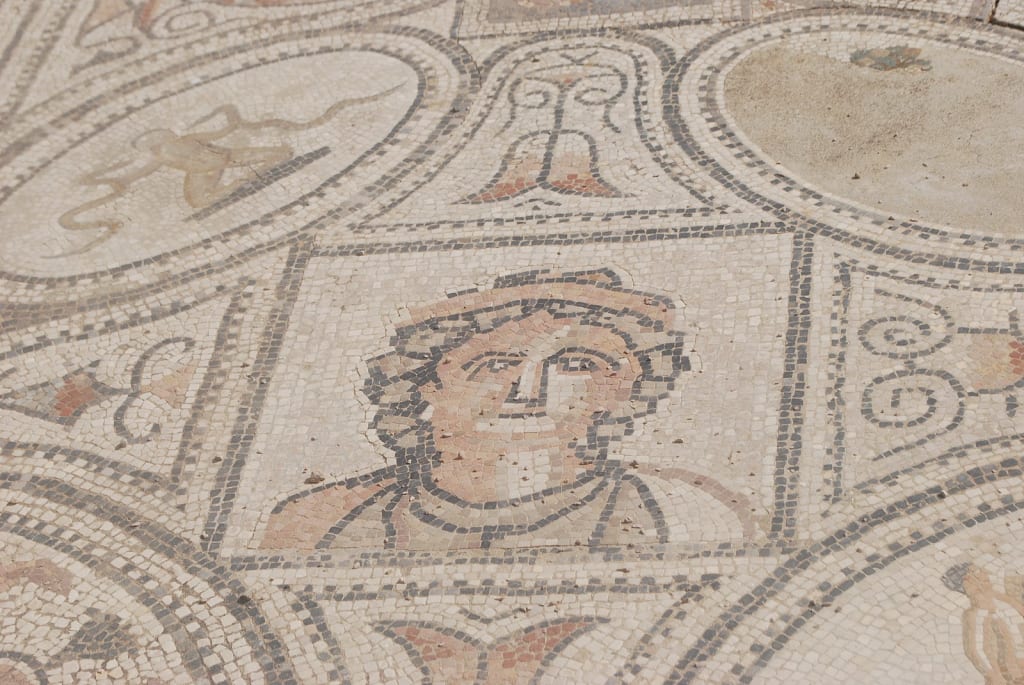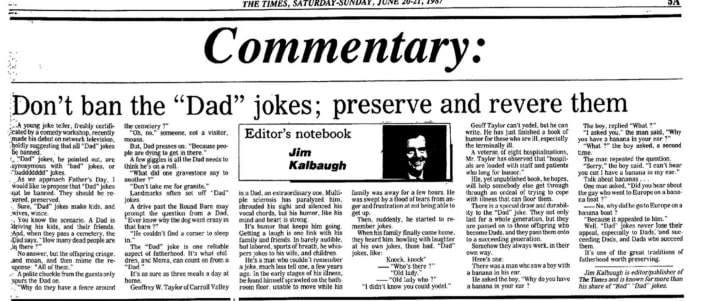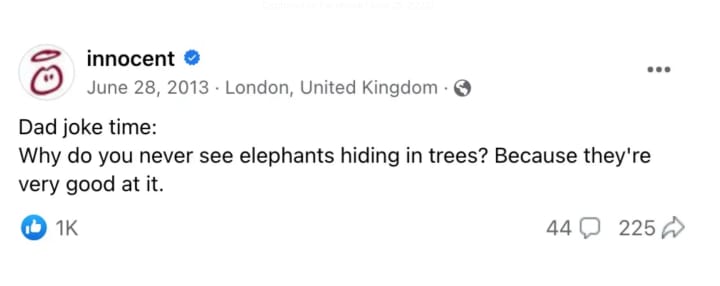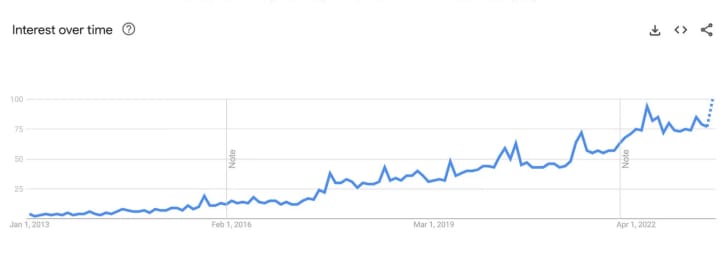The Dad Joke Was A Long Time Coming
Examining the origins of punny humor from dads.

My favorite Dad Joke comes from the video game Dream Daddy: A Dad Dating Simulator. Your player character is at a barbecue, and in one dialogue option, you and a cadre of other dads fire off a stream of dad jokes. "He's un-grill-ievable," they begin. Their children boo and plead for the dads to stop.
These types of puns have been around for a long time. A famous one comes from the Greek text the Odyssey, where our protagonist Odysseus tells a Cyclops that his name is "no man." Odysseus then stabs the creature, and when the Cyclops calls out for help, they say (roughly), "No man is attacking me." The other cyclops assume he is ill and fail to come to his aid (talk about a flawed medical system).
The "dad joke" is a sub-type of these puns. Wholesome and insufferable, they are all about inflicting mild humiliation and suffering onto a father's children or family. What we will be exploring today, or “Internet Exploring” for the dads out there, is how these jokes specifically got associated with masculinity and fatherhood and what that says about our larger society.
So strap in your seat belts as we drive into this bumpy subject.
The classical origins of Daddom (“da-dum,” if you will)
The concept of fathers having an entitlement to use wholesome puns to tease their children (as opposed to mothers who, in the modern era, are stereotypically portrayed as humorless) has more to do with current norms of masculinity and patriarchy. A dad's close relationship with their children, so much so that they can tease them with "dad jokes," hasn't always been a thing.
The thing we have to grapple with when analyzing this topic is what it means to be a father: and please keep your Hollywood monologues at the door. Child rearing has varied dramatically throughout history. In ancient Rome, for example, the head of household, or paterfamilias, was not necessarily the male parent but the oldest living male citizen in the home. He had absolute power and could sell, disown, or sometimes even kill his children if they slighted him (so sort of like Florida).
Back then, humor could run from poking at banalities of the day (e.g., bad breath, hernias, etc.) to reflecting the cruel realities of Roman life. In one example, a member of the aristocracy purchases an enslaved person, who dies shortly afterward. When the enslaver complains to the trafficker, he is told: "He didn't die when I owned him."
Dad jokes certainly existed. We see a contemporary-seeming dad joke in one example written in the Philogelos, one of the oldest surviving jokebooks (translation courtesy of Mike Fontaine). A father asks his son: "Should I call you my hope or my salvation, Pseudolus?" His son Pseudolus replies, "Both!" To which another father cheekily jumps in and says: "Hi, Both!" (I hope you don’t strain your eyes too much because we have only just started).
Yet this humor was not solely associated with fathers. In the writings of Marcus Tullius Cicero, we have an example of a soldier kicking a ball around at night, and in his play, he's suspected of breaking important statues. When it is asked why he hasn't shown up for his platoon's morning workout routine, peer Terentius Vespa quips, "Oh, it's okay — he said he broke an arm," in reference to the statue he broke the following evening (because nothing helps a joke more than explaining it in academic detail).
Humans have always seemed to love their puns. Yet, Ancient Rome is a valuable jumping-off point in this conversation, not just because it had dad jokes galore, but because its conception of fatherhood would impact the very roots of American society, and if you live in America, you know that's not necessarily a good thing.
Colonial Dads (”It’s my lawn now”)
We brought up the role of paterfamilias because it would remain alive and well into the American Colonial Period (1639 CE to 1789 CE). Though, I want to emphasize that these expectations could vary widely by race, class, and religious denomination. As John B. Kamp begins in their fantastic essay Patriarchy and Gender Law in Ancient Rome and Colonial America:
“In Colonial American society…women saw their rights restricted on the patriarchal basis of a woman’s “natural” role as pious homemaker. Roman and Colonial American gender law share a common misogyny; one rests in the patria potestas and the other in European patriarchal culture. There existed, between Roman antiquity and Colonial America, a similar legal and social discrimination on the basis of sex.”
Men mostly controlled the legal and financial rights of their spouses. Fathers also had more of a say in their children's lives, often winning custody in the case of divorce (so pretty much the modern-day Republican platform). The relationship between an individual child and a father might involve their schooling and teaching them how to do a craft. Depending on the community, communal expectations were higher, with the Puritans in the 1600s having selectmen who would inspect if children were being educated "in the right way." Children would be expected to take on economic roles far sooner, and it was not uncommon for working-class parents to contract their children out for forced labor to another family.
Of course, this dynamic assumes the child had a parental figure. In the 1600s, there were examples of street children being shipped to the Americas as indentured servants. There was also a large percentage of the child population that was enslaved, and access to parental figures would depend highly on whether their families were separated from them, which is nothing to joke about (I’ve tried).
The extent parents played and joked with their children is difficult to ascertain. We know through letters and other historical writing that some parents certainly indulged their children, but others, such as the Puritans, as theorized by Morgan in The Puritan Family, overall tried to limit it, sending their children to other families so affection would not get in the way of better manners: no one quite did social shame like the Puritans. Child play was inevitable in the early colonial days, but a father regularly joking with their kids and participating in that play seems unlikely in many colonial communities.
When we look at jokes during the early American period, while what we would know as "dad jokes" certainly existed, these did not seem explicitly tied to fatherhood like today. Take the following pun from Joe Miller's Jests, first compiled in 1739:
“The same gentleman, as he had the character of a great punster, was desired one night in company, by a gentleman, to make a pun extempore. Upon what subject? said Daniel. The King, answered the other. The king, sir, said he, is no subject.”
It's a typical "dad joke," a pun on how the word subject can be about both a topic and a reference to someone's relationship to a monarch, but it has nothing automatically to do with fatherhood or embarrassing one's children. A punster was just someone known for their puns.
Another joke from that book that might fit the traditional mold better goes as follows:
“A rich farmer’s son, who had been bred at the University, coming home to visit his father and mother, they being one night at supper on a couple of fowls, he told them, that by Logic and Arithmetic, he could prove those two fowls to be three. Well, let us hear, said the old man. Why this, cried the scholar, is one, and this, continued he, is two; two and one, you know, make three. Since you have made it out so well, answered the old man, your mother shall have the first fowl, I will have the second, and the third you may keep yourself for your great learning.”
We can see the cultural framework for the "dad joke" present. There is wholesome wit being applied here, but it's not exactly a pithy word pun, and again these puns were not associated with fatherhood. Given the radically different norms of the time concerning play with children, these puns would not be readily used on young children in the same way. Of course, every family was different, and the breaking of norms had to happen.
Industrial Dads (“Get to work, kiddo”)
Skipping forward, from industrialization onwards (starting roughly in the mid-19th century ), we see a new norm with households developing. The work of crafts, once the lifeblood of households, started to become the domain of factories, stores, and other firms, as the family moved from a unit of production to consumption. In something right out of DeSanti's presidential platform, the idealized expectations became that women keep up the home and men go to work — again, this expectation was both racialized and classist and not followed by everyone.
This shift had an understandable effect on childrearing. A more romanticized version of maternity (see the cult of domesticity), coupled with an emerging conception of childhood innocence (see child labor laws), led to the distancing of fathers from some childrearing activities. This change created a stereotype of fathers during this period, especially among middle-class white fathers, of stern patriarchs.
However, it is important to stress that the reality, like my sex life, is always more complicated. As Stephen M. Frank writes of 19th-century fatherhood in Life with Father: Parenthood and Masculinity in the Nineteenth-Century American North: "Beyond the idiosyncrasies of particular families and events, however, enough fathers occupied places toward the affectionate end of the emotional spectrum to refute stereotypes of the starched Victorian patriarch, self-contained and presiding remotely over his family.”
And indeed, poorer households could struggle to adhere to this standard as unemployed fathers might have to tend to the home as their children and wives worked. As Stephen M. Frank notes, "the family man" was primarily a middle-class invention. It was an ideal all fathers should strive toward, but not all could, and some even patently resisted.
And so, what was the record of play and joking during this period?
When we look at how fathers were sometimes depicted in literature, humor is sometimes there. In Jane Austen's Pride and Prejudice (1813), which was technically released during the first Industrial Revolution, the father figure, Mr. Bennet, is famous for his wit. He jests in the novel: "For what do we live, but to make sport for our neighbors, and laugh at them in our turn?" It is a very funny line, but it's not very punny, and it was hard to find the latter in many of literature's more famous fathers of the time.
Like every era, magazines, newspapers, and the like were packed with puns. Victorian Scholar Lee Jackson reminisces this dark gem in History Today: "Why is a dog like a tree? Because they both lose their bark once they're dead." Another goes: "Who is the greatest chicken-killer in Shakespeare? Macbeth, because he did murder most foul." While these puns were highly enjoyed, it does not seem to have been the norm for these to be linked with dads in particular.
However, as we continue into the modern era, the joking dad becomes not just a fringe example but one seen by everyone, whether their children like it or not, including on the Silver Screen.
TV Dads (“Father puns best”)
The gender and family trends of the Second Industrial Revolution would solidify during the 1900s, as the standardized expectation (though not always the reality) for white, middle-class men became that men went to work, and women managed the household.
When we look at media in the early to mid-1900s, radio and later television, this role is personified by media patriarchs. For example, the 1930s radio sitcom The Aldrich Family was about the teenager Henry and his antics. Henry was the person who played the "funny man" or comic, and his parents reacted to it as the comedic foils. In the episode Henry's Blind Date, Henry talks about giving a class pin to his crush. The crush did not like it, and when asked what the pin was, Henry explains: "All it says is 'Vote the Democratic Ticket.'" The bit escalates further as Henry tries to get his father's fraternity pin to no avail.
In a family or marital dynamic, men, particularly fathers, were the comedic foils in a double act, which was a carryover from Vaudeville where one character would be nonsensical and zany, and the other would try to poke holes and unsuccessfully bring the bit back down to earth (sort of like every group project ever). In the 1930s radio show and later 1950s TV show sitcom the Burns and Allen Show, for example, the ditzy Gracie Allen is the comic to George Burns's foil.
Several decades later, titles such as Leave It to Beaver and Father Knows Best would replicate this dynamic. Children and sometimes spouses (looking at you, I Love Lucy) would do zany things, and the man would react to them as a cool "patriarch" with a sense of reason. If this archetype sounds familiar, it’s pretty much the ideal conservatives have been latching onto for the last century, like a leech on a leg.
For example, in the episode of Leave it to Beaver called Beaver's House Guest, Wally tries to get his brother's friend Chopper to get him a new pair of football shoes. Their father tells Wally not to mooch off their brother's friends, to which Wally says: "Yeah, I guess you're right, Dad. I got friends of my own." The kids were constantly pushing against the father's common sense (which could seem quite archaic by today's standards—well, some people’s anyway), and that's where the humor lay.
As we got to the era of second-wave feminism (starting roughly in the 60s), the family would shift with the slow liberation of women in politics and economics (an ongoing project). The household, while still a unit of consumption, would see gender norms evolve. It was suddenly more socially acceptable for white women to take on a job or political office (note: poorer women, particularly poorer Black and Brown women in America, always had to work on the side, and even white women's emancipation was far from equal).
The dads in media would change as well. The Andy Griffith Show is an excellent example of this reality. It started in 1960, and in the first episode, his kid Opie is zany as can all be (objecting to his maid's wedding and everything), but the father has a wit about him. Andy Taylor, joking with Opie about their new maid, who raised Andy, saying: "She used to squeeze me so hard I'd turn all colors. That's right. I was the most loved purple baby you ever saw."
The Andy Griffith Show is a great transition as we have both a "family man" archetype, a single father no less (at least initially), but also one who has no problem cracking jokes with their kid. The era of the dad joke was upon us!
The Dad Joke comes of age
By the time we get to the 1980s, there are still gendered divisions in labor and childrearing, but the rigid patriarchal barrier where fathers do not interact with their kids had lessened. A 1987 article by Jim Kalbaugh, credited by some as thee originator of the dad joke, shared the sentiment that dads should joke with their kids. Titled Don't ban the "Dad" jokes; preserve and revere them in the Gettysburg Times on June 20th — the day before Father's Day, it argues on behalf of dad humor.

One of the first things you will notice is that we see some of the more stereotypical dad joke humor noted in this article. "Why do they have a fence around a cemetery? Because people are dying to get in there?" Kalbaugh jokes, referencing the familiar dynamic of the recipients of the joke being uncomfortable. "'Oh no,' someone, not a visitor, moans," Kalbaugh writes of the typical reaction to the dad joke.
It's also worth noting that Kalbaugh explicitly links these jokes to masculinity, particularly a stereotypical, often whiter aspect of fatherhood. "The 'Dad' Joke is one reliable aspect of fatherhood," he writes. "It's what children and Moms can count on from a 'Dad.' It's as sure as three meals a day at home." This perspective shows us something interesting because the "right" for a father to humiliate their children playfully is patriarchal.
Another thing of note is that this article is by no means the originator. In the first paragraph, Kalbaugh is reacting to a "young joke teller, freshly certified by a comedy workshop [who] who recently made his debut on network television," doing a set about how all Dad jokes should be banned. Dad jokes were popular enough in 1987 for someone to hate, though given that the word dad is in quotation marks in the title of Kalbaugh's article, the phenomenon may have preceded the phrase (though this is merely speculation).
As the decades rolled out, dads would only get zanier and punnier with their kids. Homer Simpson of The Simpsons was filled with puns: "English?" he jests in one episode, "Who needs that? I'm never going to England." Hal, the father from Malcolm In The Middle, mentions his love of puns directly, saying: "Hey have you seen my pun file? It's in a box marked laughter thoughts."
And yet these puns were still not automatically associated with dads. In 2004 the book Dad This Joke's For You: The Best Dad Jokes from the Funniest Comedians was released by Judy Brown, and here we see that although "dads' joking with their kids" is depicted as the norm, it's still not necessarily punny. Most of the humor in this book is quotes from famous standup comedians, and they are anything but wholesome. "These kids are nuts today. I got a kid myself, ten years old. He's going to be eleven, if I let him," goes a quote from Kenny Youngman (father of the year right there).
We would have to jump to the mid-2010s before we started seeing the wholesome puns being explicitly linked to dads. One of the first things I started doing for this project was to Google the term, tracing back the dad joke as far as the Internet would allow. I immediately found a 2013 Facebook post from the drink company Innocent, approximately a decade ago, writing: "Dad Joke time: Why do you never see elephants hiding in trees? Because they're very good at it."

The mid-2010s was when dad jokes started to pick up in the zeitgeist. Google Trends clearly shows it gathering favor, and we can see this emerging popularity in accompanying media. Buzzfeed, for example, published an article retreading posts from the subreddit DadJokes (founded 2011), titled 27 Cringe-Worthy Dad Jokes You Can't Help But Laugh At. The dad joke's fashionableness would increase so much so that three years later then-President Obama would tell such jokes in his final Turkey pardon in 2016.

Going forward, the dad joke would solidify into the humor we know today. We would see dad jokes in sitcoms, movies, and even video games.
A punny conclusion
The pithy pun has always been around. We started this article referencing puns in ancient Rome that are thousands of years old. They have most likely been around far earlier, and Gaia-willing will be around much longer.
What has been far more difficult to ascertain is when this type of humor became explicitly linked to fatherhood. The archetype of the inoffensive, overbearing jokester father started in the mid-1900s but did not really take shape until the 1980s and has only been dominant since the 2010s.
The evolution of the dad joke illustrates how endearing certain practices can be while also highlighting how quickly their contexts can change. If you ask me, that fact is punquestionably a good thing.
About the Creator
Alex Mell-Taylor
I write long-form pieces on timely themes inside entertainment, pop culture, video games, gender, sexuality, race and politics. My writing currently reaches a growing audience of over 10,000 people every month across various publications.






Comments
There are no comments for this story
Be the first to respond and start the conversation.